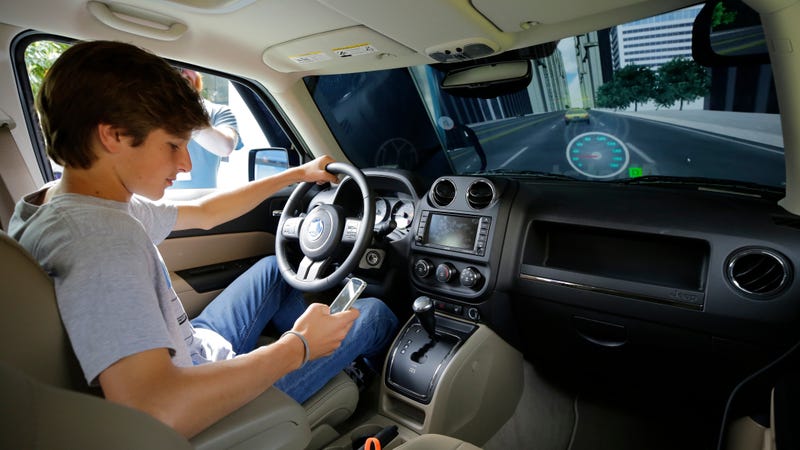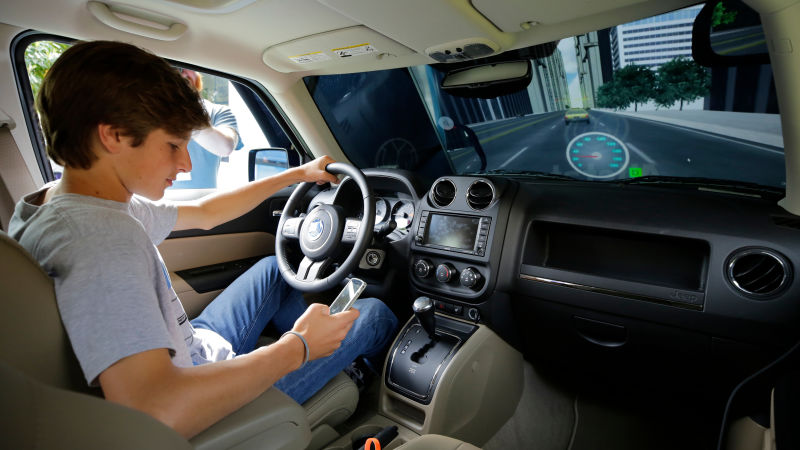
A disturbing amount of us use our phones to talk, text, or send our awful tweets while behind the wheel, but you might want to think twice before sending that next tweet, and not just for self-preservation purposes. More and more insurance companies are monitoring your cell phone usage when you’re driving.
One in five insurance policies in the U.S. now offer discounts if you allow them to monitor your vehicle, according to Bloomberg. The monitoring is intended to reward good behaviors like crash awareness or avoidance, but it can also supervise your distracted driving. Namely, your phone use.
Insurance companies are keeping tabs on how often drivers check their phones via traffic-data startups like Zendrive, TrueMotion, or Cambridge Mobile Telematics, which often offer both apps and hardware for the cars themselves to get a full picture of your driving habits. From Bloomberg:
Zendrive now has its monitoring technology on 60 million phones, roughly one of every four U.S. drivers. TrueMotion, a rival, is tracking distraction and other driving metrics for eight of the top 20 U.S. auto insurers, and an additional 30,000 drivers have voluntarily downloaded the TrueMotion system in attempt to self-regulate tendencies to talk and text at the wheel.
A third provider, Cambridge Mobile Telematics, monitors distracted driving for 35 insurers, including State Farm. In addition to siphoning smartphone data, Cambridge Mobile uses a Fig Newton-sized puck that provides even better metrics on vehicle performance and phone use. This quarter, the company shipped 8 million of the devices.
Advertisement
While insurance companies are partnering with the developers, these traffic data companies are largely marketed towards the driver; compiling data about the number of times you look at your phone or the amount of time you spend looking at a screen instead of the road. You, the driver, can check your stats and it’s up to you to decide what to do with the info.
Vice president of marketing at Cambridge Mobile, Ryan McMahon, noted that awareness of your bad behavior is more effective at curbing that behavior as opposed to straight-up punishing someone for doing something. “It’s almost like going into a restaurant and being able to see calories on a menu,” he said. “Just seeing the results helps.”
And these apps have actually been helping, according to Bloomberg:
Early trials among those using the ConnectedTravel app show a 40 percent reduction in phone use; four out of five participants check their driving metrics daily.
Advertisement
But with the increase of distracted driving—and the difficulty of enforcing texting and driving laws—insurance companies are starting to get a little desperate. Simply rewarding good behavior hasn’t been doing much for the people who consistently put themselves and others in danger by watching a screen:
Most insurance companies still only offer discounts for good cell-phone behavior, but a growing number are using the findings to raise rates on serial tap-and-swipers.
Distracted driving is more predictive of an eventual loss claim than virtually any other behavior, including speeding and braking. Those who tend to use cellphones at the wheel have 20 percent more insurance claims than others in the risk-pool, according to TrueMotion.
Advertisement
Basically, insurance companies are starting to use data you’ve already consented to give them in order to hold you accountable for your phone addiction.
The worst part is most drivers don’t even realize how much they’re checking their phone behind the wheel. We’re all inclined to believe we’re better drivers than we actually are. Zendrive conducted a distracted driving study that revealed some pretty dissonant mindsets regarding the way we use our phones:
When asked about their opinion on distracted driving, 85 percent of respondents identified the issue as a very important problem. When asked to rate their overall driving safety, 90 percent claimed to be safe drivers, but 47 percent admitted to using their device so often they fall in the Phone Addict category. What do we do when almost half of all drivers on the road classify themselves as “safe drivers” despite spending 10 percent of their time distracted behind the wheel?
Advertisement
That’s why these data collection companies have become more prevalent. On paper, they’re trying make us recognize our bad habits so that we might start trying to curb them (though let’s be honest and admit that data has plenty of other value too.)
But in the event that drivers refuse to do it on their own, insurance companies are increasingly taking a step forward to start making those drivers pay—literally.
As dystopian as it is to have our every move watched by just about any company who asks for the information, some of us behind the wheel have kinda brought it on ourselves in this particular case. The more we use our phones behind the wheel, the more invasive this kind of shit is going to get.













